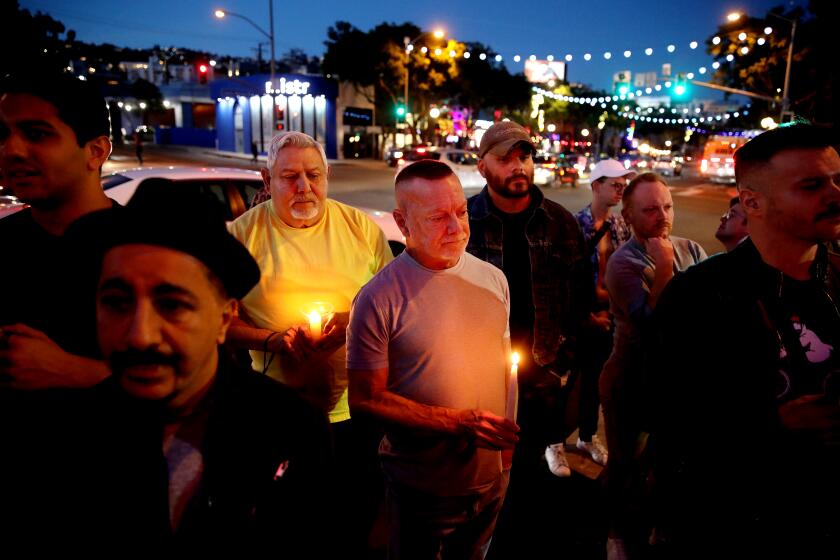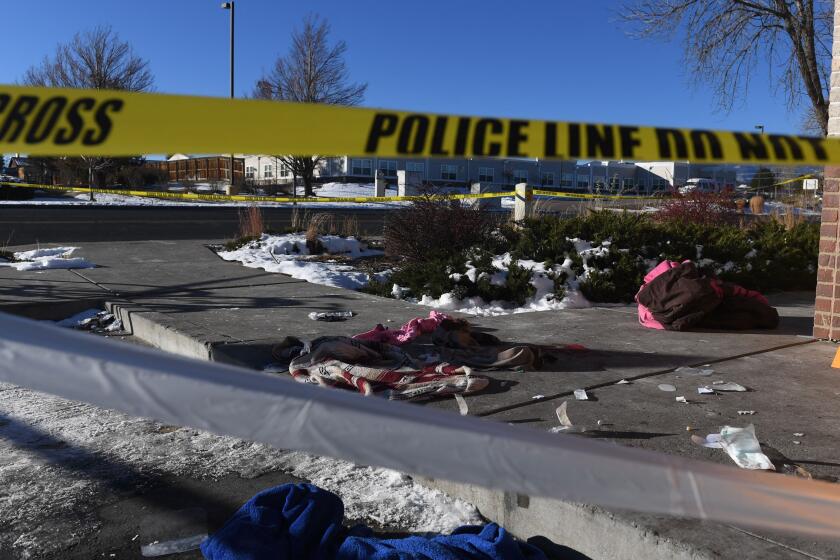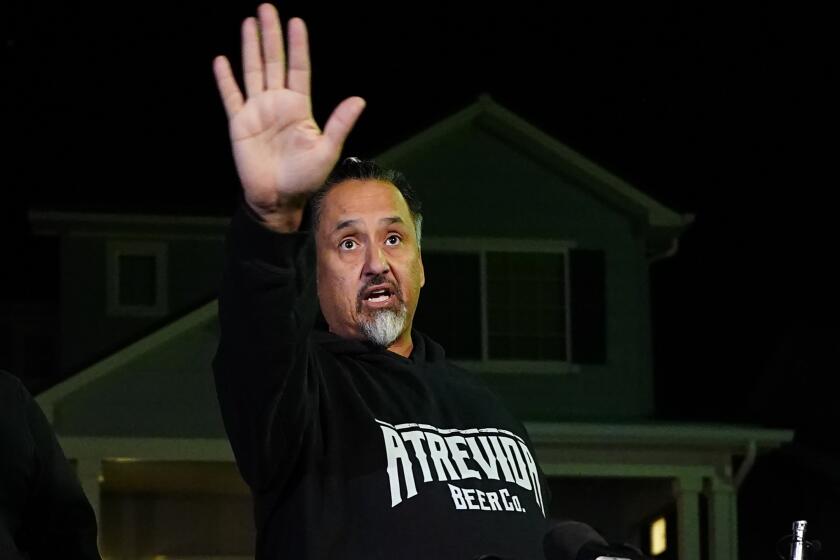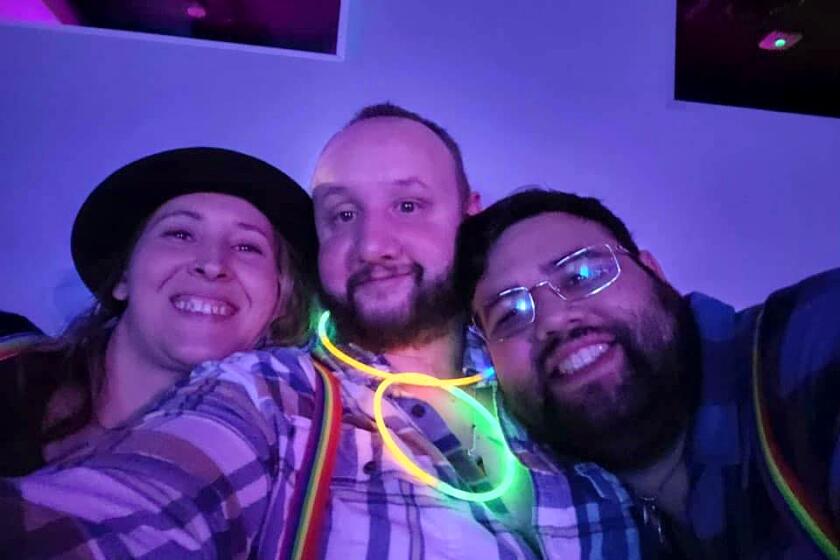Anderson Aldrich: Fragments of a troubled young life emerge, but mysteries remain
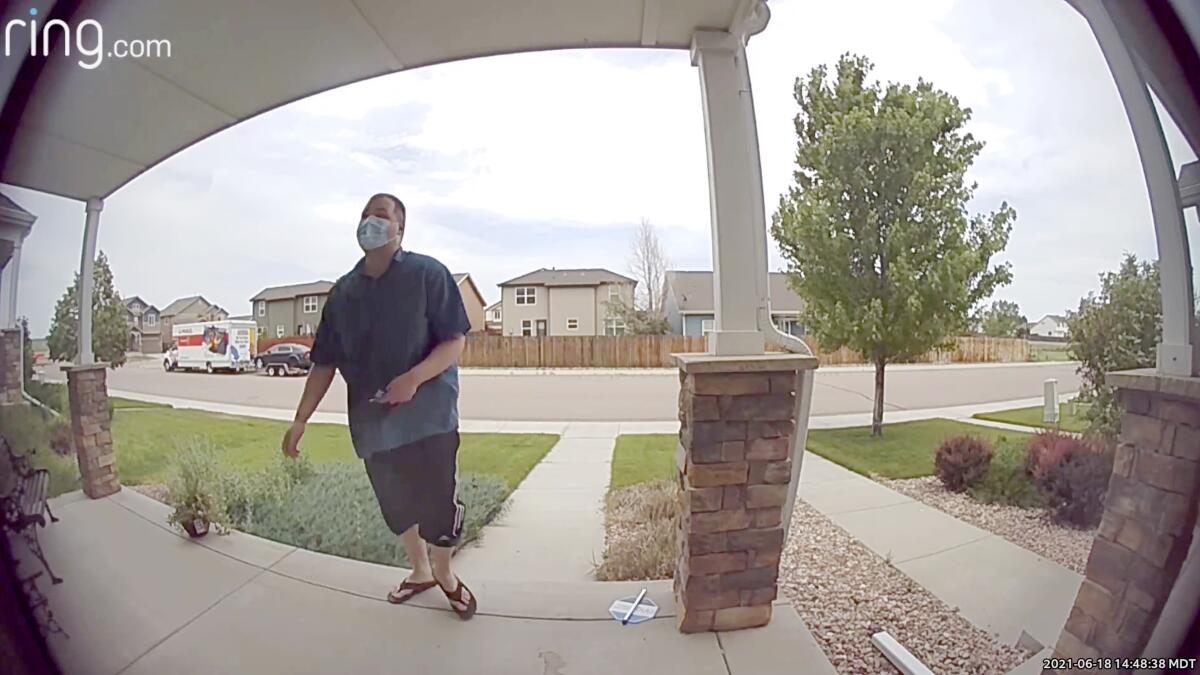
- Share via
New details have emerged in the case against Anderson Aldrich, the suspect in the deadly shooting at an LGBTQ nightclub, that have raised further questions about a potential motive in the attack that left five dead and 18 wounded in Colorado Springs, Colo.
The day before Aldrich was set to appear for the first time in court, the 22-year-old’s attorneys submitted a filing explaining that Aldrich identifies as nonbinary and uses they/them pronouns.
That information is among the few pieces gathered about Aldrich.
Scattered elements of the suspect’s biography — a name change, a 2021 arrest in which their mother accused them of threatening her with a homemade bomb, a family connection to a California lawmaker — have emerged. But much is still unknown.
Little about Aldrich has turned up online or on social media, and only the suspect’s estranged father has spoken publicly since the Colorado shooting.
Aldrich appeared via video Wednesday from the El Paso County Jail during a six-minute hearing after being released from the hospital after Saturday’s attack. They were ordered held without bail. No formal charges have yet been filed, and the next court hearing is scheduled for Dec. 6.
The suspect only spoke while answering the judge’s questions. They said their name out loud, “Anderson Aldrich,” and answered yes when the judge asked if they watched the video about their constitutional rights in this case.
Aldrich was arrested on suspicion of murder and bias-motivated crimes — Colorado’s term for hate crimes — police said, but officials have not identified what prompted the shooting.
Legal experts say Aldrich’s gender identity has no bearing on whether hate crime charges could be filed.
A spokesperson with the district attorney’s office of Colorado’s 4th Judicial Circuit declined to comment on whether Aldrich’s gender identity would disqualify them from any charges in connection with the fatal shooting and said “evidence will drive the appropriate charges.”
Aldrich’s attorneys requested the arrest warrant be unsealed, but did not respond to further requests for comment.
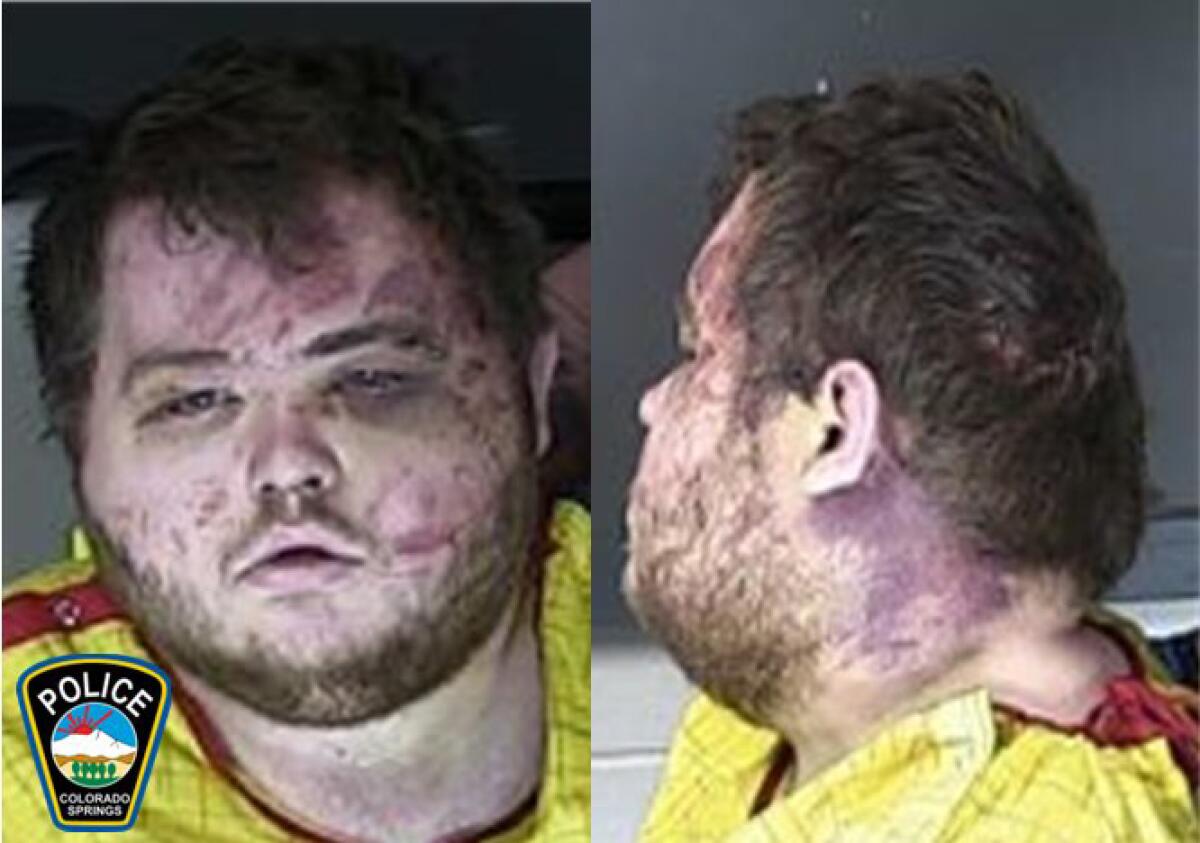
Aldrich was born on May 20, 2000, to Laura Voepel and Aaron Brink in California, according to Orange County court records. The next year, Brink filed for divorce, and Voepel was given full custody of their child, with no visitation rights granted to Brink.
In the following years, Aldrich moved around with their mother to Texas and then to Colorado, at times living with their maternal grandmother. They also have a younger brother, according to Voepel’s Facebook page.
Aldrich is the grandchild of California Assemblyman Randy Voepel (R-Santee), an aide for the legislator told The Times on Monday.
The outgoing state representative previously aligned himself with the tea party movement and later drew criticism for comments that likened the Jan. 6 insurrection at the U.S. Capitol to the shots fired at “Lexington and Concord” in the Revolutionary War. He declined to comment further about his grandchild on Monday, the aide said.
Anderson Lee Aldrich appears to have little social media footprint. But the suspect in the Colorado Springs mass shooting appears connected to earlier arrest.
Aldrich’s parents have criminal records, court records show. Laura Voepel was found guilty of a reduced charge of criminal mischief in San Antonio and sentenced to five years of probation, according to court documents.
Brink, Aldrich’s father, also was arrested on drug-related charges and other crimes. Brink was an MMA fighter, according to the Colorado Springs Gazette. He appeared in an episode of the reality TV series “Intervention,” according to his IMDb page.
Court records in Bexar County, Texas, show Aldrich filed to formally change their name six years ago to Anderson Lee Aldrich. The request was approved May 4, 2016.
According to the Associated Press, a petition for the name change said Aldrich wanted to protect their future “from any connections to birth father and his criminal history. Father has had no contact with minor for several years.”
The Washington Post reported that Aldrich had endured a “particularly vicious bout of online bullying.”
The attorney who represented the family in the case did not respond to questions from The Times.
Kristen Browde, an attorney and chair of the National Trans Bar Assn., said that regardless of Aldrich’s gender identity, “one’s membership in a protected group in no way obviates the possibility that the crime the individual commits is motivated by hatred.”
“The reality is that no matter what this individual’s motivation turns out to be, the fact is there are extremists who are speaking from pulpits and broadcast microphones who are inciting this violence and saying things like, ‘I would shed no tears’ or that LGBT people should be tied up and shot in the back of the head,” she said. “Whether that turns out to be the motivation for this attack or not, those kind of statements are beyond dangerous.”
A gunman opened fire shortly before midnight at a gay nightclub in Colorado Springs, killing five and injuring 25. A suspect was subdued and is in custody.
Brink said his ex-wife told him that Aldrich had changed their name out of embarrassment that Brink was their father and that Aldrich had died, the New York Times reported.
But then months ago, Aldrich called Brink. The conversation turned into an argument, with Aldrich threatening to beat up Brink.
Brink, who identifies as a religious and conservative Republican, told the paper he had voiced disapproval of gay people when Aldrich was younger but expressed sympathy to the families of the shooting victims.
Aldrich was arrested in June 2021 in a suburban Colorado Springs neighborhood where they and their mother lived at the time, after Voepel reported Aldrich threatened her with “a homemade bomb, multiple weapons and ammunition,” according to the El Paso County Sheriff’s Office.
The incident ended in a standoff with deputies and the evacuation of nearby homes, but officials said they did not find any explosives after Aldrich’s arrest.
It happened at the home of Leslie Bowman, who was renting a room to Aldrich’s mother. Bowman shared videos from her Ring security camera with The Times showing Aldrich — who she said went by Andy — entering her house.
In the video, Aldrich said: “The police have surrounded that house. This is where I stand, OK? … Today I die.”
Voepel responded, “What is happening?”
“They don’t give a f— about me anymore, clearly,” Aldrich replied.
Anderson Lee Aldrich was arrested on suspicion of murder and hate crimes in the shooting at Club Q in Colorado Springs, Colo.
In another video Bowman recorded of a Facebook Live stream, which Bowman said Aldrich posted during the standoff, Aldrich was seen wearing what appears to be a helmet and body armor.
“This is your boy,” Aldrich said on the recorded livestream. “If they breach, Ima ... blow it to holy hell!”
In the last Ring video from the incident, Aldrich was seen leaving Bowman’s house about three hours later with their hands in the air and no longer wearing a helmet or body armor. The report from the Sheriff’s Office said Aldrich was arrested without issue. Charges in the incident, however, were later dismissed.
There’s also no public record that police or relatives tried to trigger Colorado’s “red flag” law after the arrest, which could have allowed authorities to seize any weapons or ammunition in Aldrich’s possession, or prevent them from purchasing any, at least temporarily.
Bowman said Aldrich’s mother moved out of the room she was renting about two days after the arrest, and she hasn’t kept up with either Voepel or Aldrich since. At the time, Aldrich lived about a mile away with their grandparents but would often visit their mother, Bowman said. She said that the teen was never talkative and that Voepel and Aldrich often would watch movies together.
They “would come over from time to time, sometimes once or twice a week,” Bowman said. She described Aldrich as “pretty quiet.”
She said there was only one other incident in which Aldrich became aggressive, getting in her face and slamming the door on her after a dispute between Bowman and Voepel in early 2020. But Bowman said. Aldrich didn’t become physically violent, and she chalked it up to being protective of their mother. Bowman said she didn’t know whether Aldrich, then 20, was in school or working.
Bowman said she found it hard to believe Aldrich identifies as nonbinary.
“I have only ever known him as a he/him. Laura only ever referred to him that way, as ‘my son,’” Bowman said. “There was never anything other than he/him pronouns and referring to him in the masculine.”
Club Q in Colorado Springs was what many queer bars are: a ‘safe space’ to let loose and have fun.
Bowman said she is still concerned that the initial charges against Aldrich were dropped.
“In an incident as serious as that, there should be at least some sort of plea deal, just something, to keep [them] on the radar,” she said.
In the months before the shooting, Aldrich’s mother posted in a Facebook group for women in the Church of Jesus Christ of Latter-day Saints, asking for help.
She asked in February for recommendations for a “trauma/PTSD therapist,” writing that it was for a “21-year-old,” the same age Aldrich was at the time.
Nearly three months later, she asked whether anyone could refer her child — whom she described as “6’6” tall and hits like a freight train” — to a private boxing coach.
“Cannot find a good gym or anyone serious,” she wrote. The post said her child had “made huge life changes and needs this!”
Times staff writers Hannah Wiley and Terry Castleman contributed to this report.
More to Read
Sign up for Essential California
The most important California stories and recommendations in your inbox every morning.
You may occasionally receive promotional content from the Los Angeles Times.
